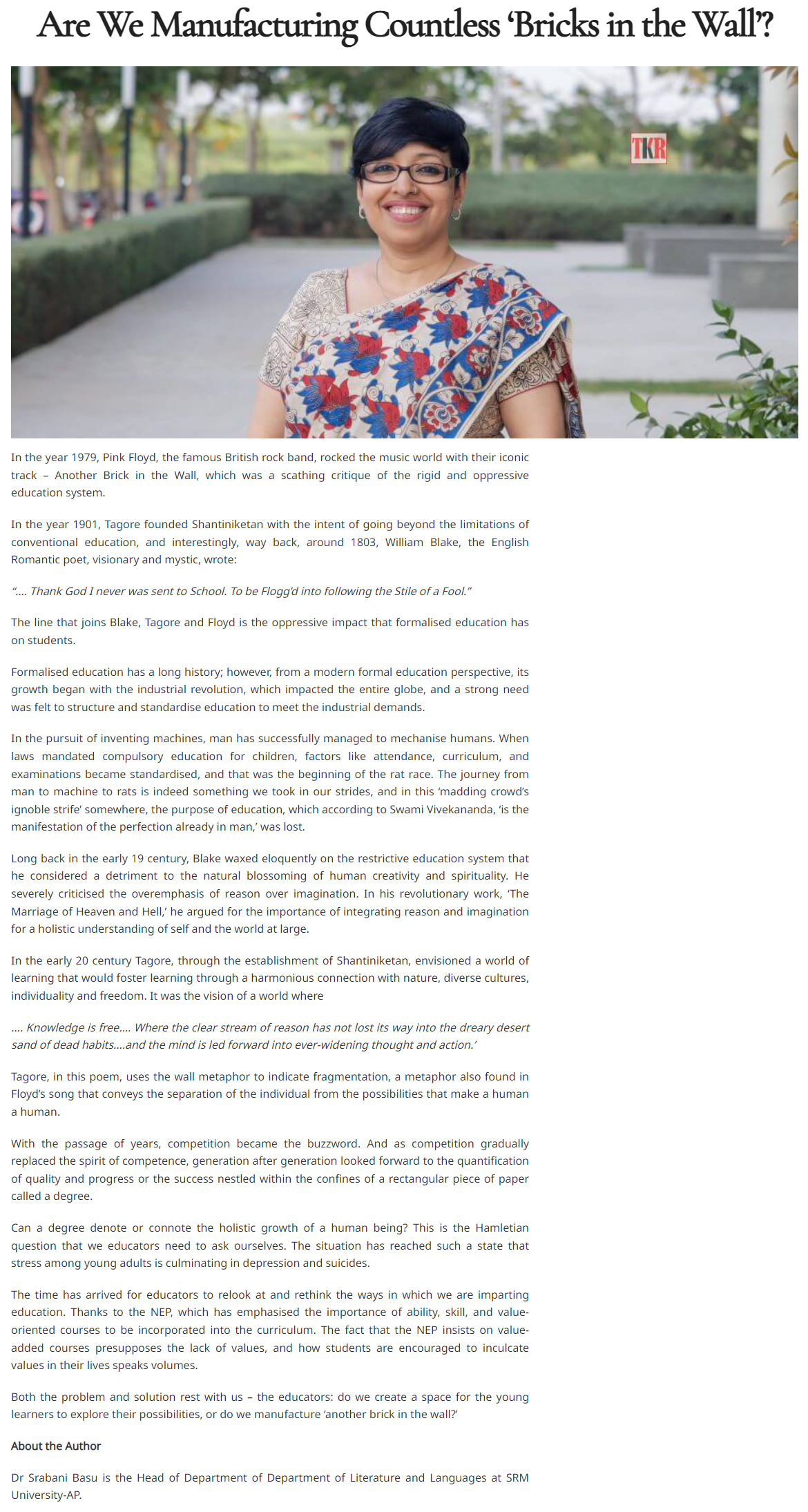All Management News
- Dr Juman Iqbal July 10, 2023
- An Algorithm to Assess Employee Attrition Rate in Organisations July 7, 2023
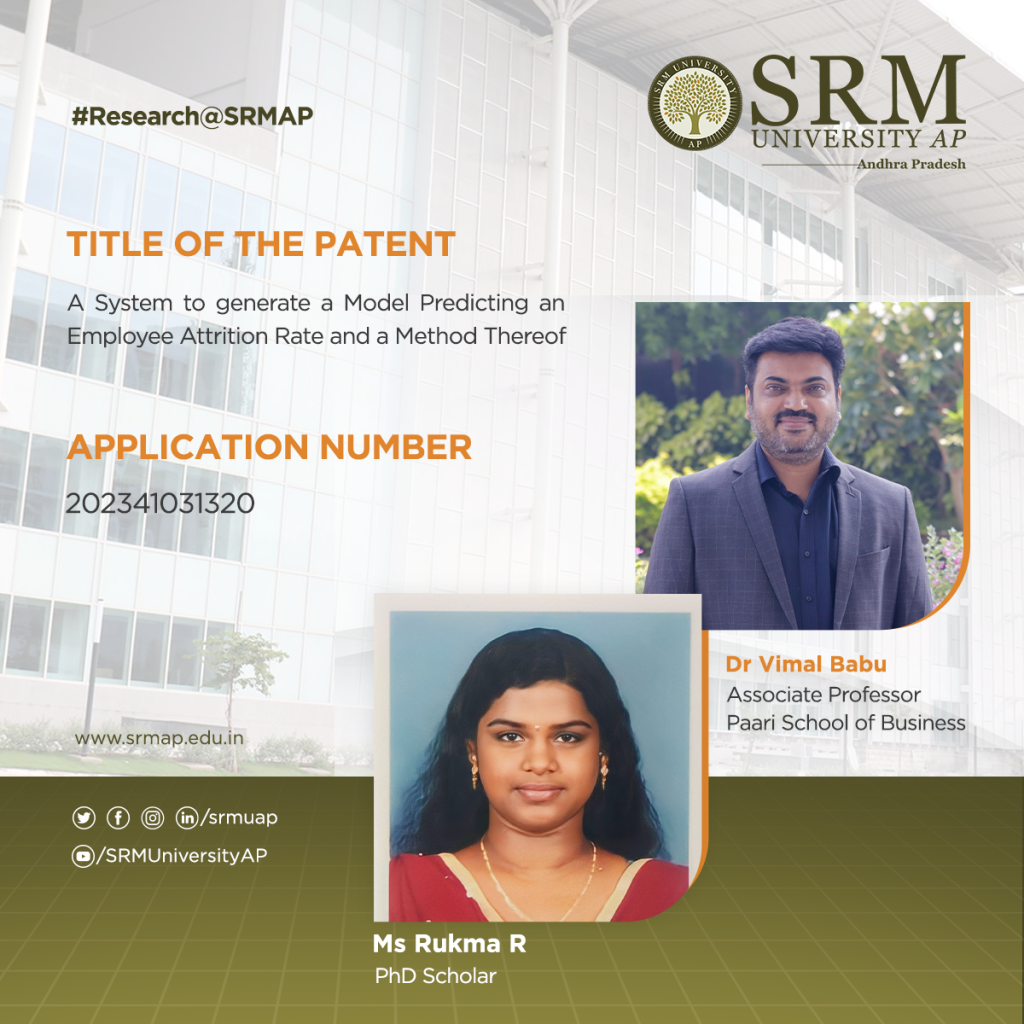
Socially relevant and community-centric research is of primal focus at SRM University-AP leading to innovations that transpire into transforming society. Dr Vimal Babu and his research scholar Ms Rukma R, Paari School of Business, have undertaken creative research to understand employee attrition in organisations critically. The research cohort employed a modified Random Forest Algorithm for assessing employee attrition and analysing its findings and benefits to Human Resource departments of corporate houses. Their groundbreaking invention and research titled “A System to generate a Model Predicting an Employee Attrition Rate and a Method Thereof” with Application No: 202341031320 has recently been filed and published under the Patent Office Journal.
Abstract
The problem of employee attrition in every organization concerns the employee turnover ratio, thereby increasing the cost of investment in human resources. Various factors are reasonable for the rapid attritions at different phases. The purpose of the current study is to predict the employees who are likely to leave the organization. The factors that lead to attrition are identified using the Random Forest algorithm. Random Forest algorithm is one of the widely used supervised machine learning technique for both classification and prediction. However, the random forest algorithm has specific issues, such as it is too slow and ineffective for real-time predictions. i.e., the large number of trees can make the algorithm, which results in a slower model. Therefore, the study proposes a new alternative for choosing the appropriate decision trees based on the concept of fractional factorial design of experiments. The different performance criteria were compared across the modified random forest algorithm, existing random forest algorithm, Support Vector Machine (SVM), Logistic Regression (LR), Navie Bayes (NB), K – Nearest Neighbour (K-NN), Decision Tree, XG Boost tree and Neural Network (NN). It was found that the modified random forest algorithm excelled in all criteria and performed better than the existing ones.
The findings of this study offer valuable assistance to human resources departments by providing necessary insights into potential employees’ decisions to leave the company. By analysing the identified factors or reasons for leaving the organisation, HR professionals can better understand attrition patterns and make informed decisions to improve employee retention. The proposed method not only assists in identifying the factors contributing to employee attrition but also predicts the likelihood of attrition based on employee signals. This predictive capability enables organisations to proactively address potential attrition cases and take preventive measures to retain valuable employees.
Practical implications of the research
Overall, the practical applications include designing retention strategies, predicting attrition cases, tailoring employee engagement initiatives, developing HR policies, optimising recruitment and selection processes, benchmarking attrition rates, and implementing continuous improvement measures. These applications can collectively contribute to reducing employee attrition and enhancing overall employee retention in organizations.
Collaborations and Future research plans
The applicants, viz. Ms Rukma, R.; Dr Vimal Babu and Dr Vijaya Prabhagar, M. plan to collaborate in the intersecting area of HR and analytics to arrest employee attrition by employing sophisticated analytics models and explore the future scope of our research to come up with impactful research outputs benefitting the industry.
Continue reading →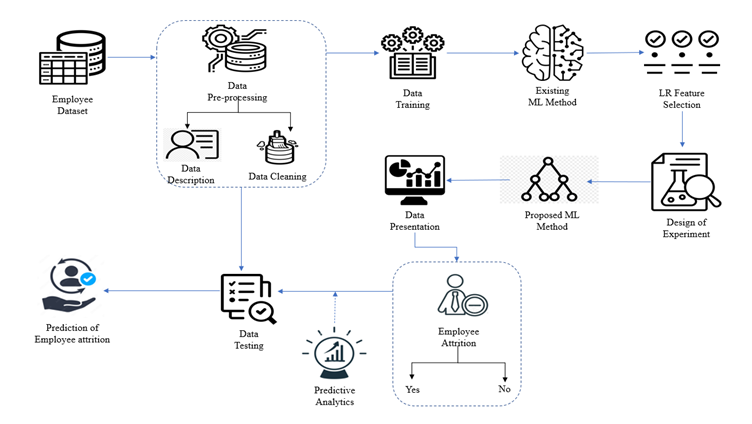
Phases of prediction of employee attrition
- Delivered Lecture at the Two–day National Conference on Youth Development at RGNIYD July 7, 2023
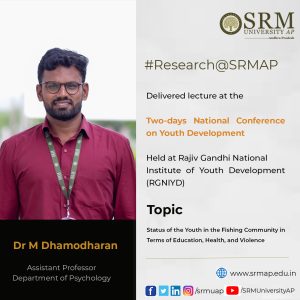 During the Two-day National Conference on Youth Development titled Youth in the 21st Century: Prospects and Psychosocial Challenges, organised by Rajiv Gandhi National Institute of Youth Development (RGNIYD), Sriperumbudur, Tamil Nadu, in collaboration with ICMR – NIRT, Chennai, Dr Dhamodharan, Assistant Professor, Department of Psychology, presented a lecture on Status of the Youth in Fishing Community in Terms of Education, Health, and Violence.
During the Two-day National Conference on Youth Development titled Youth in the 21st Century: Prospects and Psychosocial Challenges, organised by Rajiv Gandhi National Institute of Youth Development (RGNIYD), Sriperumbudur, Tamil Nadu, in collaboration with ICMR – NIRT, Chennai, Dr Dhamodharan, Assistant Professor, Department of Psychology, presented a lecture on Status of the Youth in Fishing Community in Terms of Education, Health, and Violence.Abstract
Over sixty percent of the fisher population in India is Below Poverty Line (BPL). For traditional fishers, fishing is their primary source of income, and they have no other options. Hence, families in the coastal village are socially, financially, and educationally disadvantaged and frequently face financial difficulties. Additionally, the literacy level of the fishing community is deficient. Fishers have met an unbalanced diet, tension, excessive drinking, tobacco usage, and harmful behaviours. Fisher communities are often underprivileged and constitutionally and communally isolated from other communities. Limited research has been conducted on the fishing community youth, particularly in Tamil Nadu and Pondicherry. Hence, the study needs to be understood and conducted for the fishing community youth regarding education, health, and violence. The empirical study combined quantitative and qualitative approaches to Tamil Nadu and Pondicherry fishing community youth. The study tools used for the data collection are a semi-structured questionnaire for youth for their perspective on health care, school, violence, and family support and a semi-structured questionnaire to the parents regarding their perspective on their children’s education, health, violence, and family support. Twenty case studies were conducted in the selected clusters. Also conducted were key informant interviews with fishing community leaders in four clusters. The results showed that more than 50 % of participants face verbal violence, more than 80 % face physical violence, and nearly 25% face sexual violence. The fishing community is an under-educated, predominantly nuclear family, and the family income is less than ten thousand rupees monthly. Physical abuse had significantly associated with place of residence, Puducherry residing youth had more physical abuse than Tamil Nadu. The social-economic condition of the family and the parental education seemed to be better in the state of Tamil Nadu as compared to Puducherry. Youths from Puducherry had a greater risk of experiencing physical and verbal abuse. Parents had a relatively low level of awareness and understanding of child rights and laws. The study’s results helped to understand the problem of fisher community youth and their perception of parental care, education, health, and violence.
Practical Implementation of the Findings
- Social welfare department and local NGOs to take up need-based intervention programmes for the welfare of the fishing community and youth.
- The youth welfare department understands the problems of youth in the fishing community.
- Policymakers to develop policies and legislation for the youth of fishers in the education and health sectors.
- Understanding the problems and violence against the youth of the fisher community, as well as helping the Non-Government Organisations for making intervention programs at the community level.
- Assist the school administration in better understanding the Fisher community students’ situation and creating counselling centres in school settings.
- Explore the World of Literature and Language with a BA degree in English July 5, 2023
Unlock Your Literary Potential with a BA in English
The BA in English programme is a gateway to a world where ideas take flight, words come alive, and stories resonate through time. If you have a love for literature, a passion for language, and an aspiration to understand the power of communication, a BA in English Honours is a fulfilling academic journey to embark upon.
From exploring literary masterpieces to honing critical and creative thinking, and analytical skills, the BA in English course provides a well-rounded education that nurtures creativity, cultural comprehension, and effective communication. This article will provide you with comprehensive BA English course details, imparting insights into its curriculum highlights and career opportunities.

Whether you aspire to become an educator or writer or pursue a plethora of other professional paths, this article will serve as a valuable guide to unravel the richness and possibilities that a BA in English programme offers.
What Are the Subjects Included in the BA English Course Curriculum?
With a curriculum incorporating a wide range of subjects in BA in English Honours, from English literature to world literature and creative writing, individuals will develop a deep treasure for the written word and acquire a distinct understanding of human expression.
Some of the common BA English course subjects and themes that are typically covered in the programme curriculum include the following:
- English Literature
- Language and Linguistics
- Literary Criticism and Theory
- World Literature
- Creative Writing
- Communication Skills
- Research Methodology
- Literary History and Periods
- Academic Writing
- Public Speaking
- Psychology of Mythology
- Neuro Linguistic Programming
- Project Based Learning
What is the Scope of a BA in English?
The scope of a BA in English is immense and offers innumerable career opportunities in multiple fields. The programme equips individuals with invaluable transferable skills, including effective communication, critical analysis, research proficiency, and the ability to forge compelling arguments. These skills are highly coveted in diverse areas, including publishing, journalism, marketing, education, and beyond.
Therefore, the scope of a BA in English course is wide-ranging, empowering graduates with a solid grounding of skills. Here are some of the high-paying areas for graduates with a BA degree in English:
- Publishing and Editing
- Writing and Content Creation
- Education
- Journalism and Media
- Public Relations and Advertising
- Content Management and Digital Marketing
- Civil Services and Competitive Exams
Transform Your Passion for Literature into a Lucrative Career with a BA in English Honours at SRM University-AP
The BA in English Honours programme offered at SRM University-AP, strives to help an individual in attaining the ability to perform in a number of contexts ranging from professional, academic, or social (in a given situation) to both communicative with the vital ability to critically think and persuade. The BA in English Hons programme at SRM University-AP will assist its students in further pursuing research areas of their interest while remaining flexible towards all the other areas of expertise.
Students who seek to undertake rigorous instruction in English can be admitted to the English Honours programme. The enrolled students in the English Honours programme will get the opportunity to take five additional Elective Courses imparted by the Department of Literature and Languages at SRM University-AP over the course of three years. This additional instruction of the programme will begin in their second semester and end in their final semester.
Moreover, at the end of the BA in English Honours programme, the student of SRM University-AP will have to undergo an additional 20 Credits in English language and literature and will be allowed to speak with authority on essential topics related to English.
Integrated Learning and Interdisciplinary Research
The department offers a more comprehensive integrated learning experience. Research is an integral part of the undergraduate programme and envisions the holistic development of students through multi-disciplinary, interdisciplinary, and transdisciplinary learning approaches. It is a space for interdisciplinary research, thought and pedagogy.
Interdisciplinarity refers to an active and productive exchange between the various science and humanities disciplines within the School of Liberal Arts and Social Sciences at the university. It facilitates engagement and conversation across the social and natural science divide. Intellectual resources are drawn across the schools of the university, identifying convergences and research themes where both can symbiotically benefit.
The department fosters interdisciplinary foundations and research through participatory, experiential, discursive and student-centric learning practices. The curriculum is research-oriented, dynamic, and flexible, which enables students to choose courses and minors from other Disciplines/ Schools in the University.
To Wind Up
BA in English is not just a degree but an entranceway to a world of never-ending possibilities. It fosters a deep understanding of language, literature, and critical thinking, providing graduates with a versatile skill set for a diverse range of career paths. From writing and publishing to education and media, a BA in English Hons degree opens doors to an enriching professional journey and creates a significant impact in the fields where words are a powerful tool.
Experience the magic of learning where literature is a skill, language, a science and the Pedagogy, an art!
Continue reading → - Dr Suryakanta Nayak July 5, 2023
- Semester Abroad Programme- Spring 2024 July 5, 2023
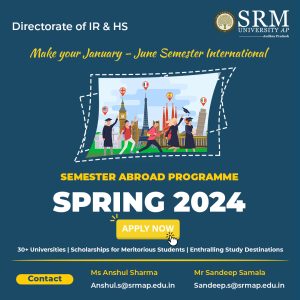 Embarking on a semester abroad is an unparalleled adventure that broadens horizons, challenges perspectives, and opens the door to a world of endless possibilities. A Semester Abroad Programme beckons students to immerse themselves in a tapestry of cultural diversity, academic excellence, and personal growth. The Semester Abroad Programme-Spring 2024 applications are now open, urging you to make your January-June Semester international! Through this transformative journey, participants are in for a voyage of self-discovery, forging lifelong friendships, embracing new languages, and acquiring a global perspective that transcends borders.
Embarking on a semester abroad is an unparalleled adventure that broadens horizons, challenges perspectives, and opens the door to a world of endless possibilities. A Semester Abroad Programme beckons students to immerse themselves in a tapestry of cultural diversity, academic excellence, and personal growth. The Semester Abroad Programme-Spring 2024 applications are now open, urging you to make your January-June Semester international! Through this transformative journey, participants are in for a voyage of self-discovery, forging lifelong friendships, embracing new languages, and acquiring a global perspective that transcends borders.30+ Universities, such as the University of California- Berkeley, UC Davis, Monash University, University of Wisconsin, University College Dublin and many more, are lined up for the programme. Meritorious students can obtain scholarships through various proficiency tests and study at enthralling destinations such as The United States of America, the United Kingdom, Australia, Singapore, Malaysia, Ireland, and many others.
At SRM University-AP, the Semester Abroad Programme, meticulously organised by the Directorate of International Relations and Higher Studies, aims to provide a life-changing experience that profoundly influences individuals’ perspectives and nurtures a global mindset. With each step taken beyond the confines of their comfort zones, students take off a path that enriches their academic journey, shapes their character, and empowers them to become global citizens of the 21st century.
Continue reading → - Are We Manufacturing Countless ‘Bricks in the Wall’? July 5, 2023
- Dr Anirban Bhar July 4, 2023
- Dr Kamal Das June 30, 2023
- Multidisciplinary Challenges in Green Smart Cities Implementation June 30, 2023
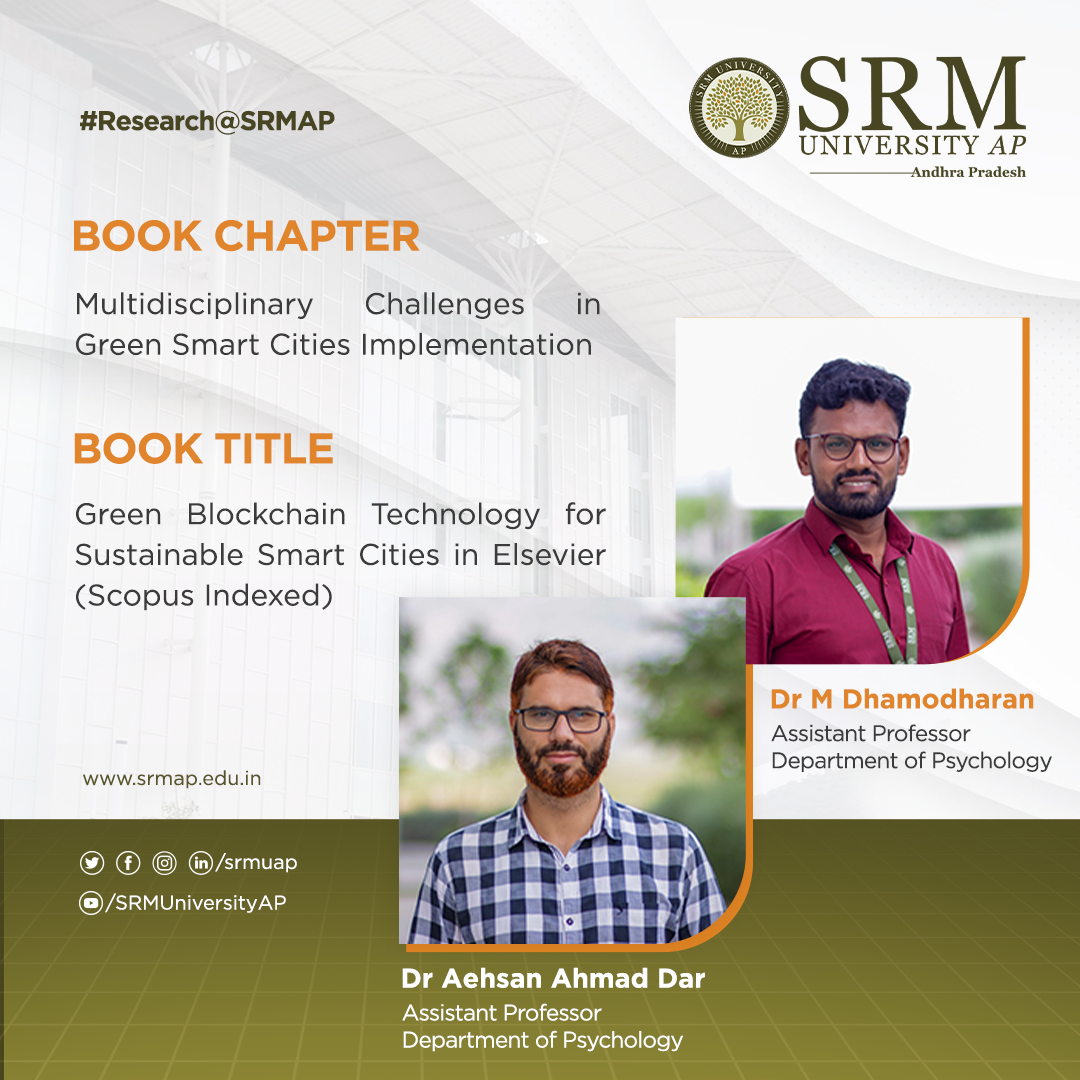 As the world grapples with the escalating challenges of urbanisation and environmental degradation, the concept of green smart cities has emerged as a promising solution. Green smart cities integrate advanced technologies, sustainable practices, and innovative urban planning to create environmentally friendly, resource-efficient, and liveable urban spaces. However, implementing green smart cities poses numerous multidisciplinary challenges that require careful consideration and collaborative efforts from various fields.
As the world grapples with the escalating challenges of urbanisation and environmental degradation, the concept of green smart cities has emerged as a promising solution. Green smart cities integrate advanced technologies, sustainable practices, and innovative urban planning to create environmentally friendly, resource-efficient, and liveable urban spaces. However, implementing green smart cities poses numerous multidisciplinary challenges that require careful consideration and collaborative efforts from various fields.Assistant Professors Dr Dhamodharan M and Dr Aehsan Ahmad Dar from the Department of Psychology have published a chapter titled Multidisciplinary Challenges in Green Smart Cities Implementation in the book Green Blockchain Technology for Sustainable Smart Cities in Elsevier, which is Scopus Indexed.
Focusing on challenges in green smart cities implementation will help the policymakers, government, and public to get aware of the problems related to all aspects. Implementing green smart cities may provide difficulties in the previously described dimensions of governance, economics, social interaction, technology, and ethics. Therefore, as the world’s population grows, there is a need to adapt to the changes, such as green smart cities. Government, policymakers, and the general public should adopt solutions to societal issues supported by science and research. The next generation will find it convenient and necessary to develop green smart cities. The world will prosper with green smart cities if policymakers, the government, and the people simultaneously identify the issues and begin the work properly with the right strategy and support.
Abstract
Villages are the pride of the nation. Nevertheless, cities reflect the nation’s growth and prospects. Department of Economic and Social Affairs in the United Nations explained that the universe’s people will be nearly 70 % in urban areas by 2050. Cities worldwide are facing important issues with increasing urbanisation, environmental sustainability, unemployment, slums, and mitigation of climate variation. So, policymakers and researchers focused on the concept of a smart city to manage these challenges. Consequently, the concept of “Smart Green Cities” came into the picture. Smart green cities are the collaborative hub linked with business, government, education, and the public to generate comfortable living in urban environments by encouraging change with scientific-based problem-solving. In simple terms, Green smart cities are technologically advanced in solving problems without harming the environment. For Implementing green smart cities, developed and developing countries are collaborating and signing a memorandum of understanding with one another. Government representatives, educators, and the public should cooperate to make a green smart city successful.
Green smart cities make global connectedness, productivity, efficiency, and revolution possible. Meanwhile, poorly regulated green smart cities will result in environmental difficulties like socioeconomic inequalities, poor public safety, and conservational destruction. Furthermore, implementing green smart cities is not a simple strategy. This chapter discusses multidisciplinary challenges in green smart cities’ implementation. People face challenges through green smart cities implementation in the following sustainability dimensions such as Blockchain challenges, Governance challenges, Economic challenges, Social challenges, Technology challenges, Environmental challenges, and Ethical challenges.
Collaborations
- Dr Dhamodharan M, Assistant Professor, Department of Psychology, School of Liberal Arts and Social Sciences, SRM University-AP.
- Mr Vimalkumar, Research Scholar, Department of Mechanical Engineering, Indian Institute of Technology, Palakkad, Kerala
- Dr Aehsan Ahmad Dar, Assistant Professor, Department of Psychology, School of Liberal Arts and Social Sciences, SRM University-AP.


